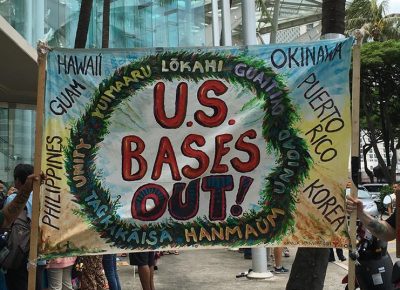US Continues Massive Military Build Up
America's “inward turn” is in fact an invention of the mainstream media

Less than a year into his second term as president, Barack Obama addressed the nation by saying “for nearly seven decades the United States has been the anchor of global security”. Among his first words, Obama highlighted Syria and “where we go from here… against the repressive regime of Bashar al-Assad”.
Obama accused (without a shred of evidence) the Assad government of having “gassed to death over a thousand people”, lamenting “the terrible nature of chemical weapons” which are “a crime against humanity”. Obama neglected to mention how, 25 years before, American policies made possible the most destructive gas attack of the post-World War II period – Saddam Hussein‘s assault on the Kurds of Halabja, northern Iraq, which killed at least 5,000 people.
In March 1988, Halabja – just nine miles from Iran’s border – was targeted by the US-sponsored Iraqi army, due to the city being under the control of the Tehran-allied Kurdish guerrillas. The Reagan administration was heavily supporting Hussein during the Iran-Iraq War (1980-1988). Iranian nationalists had previously overthrown the US-backed dictatorship of the Shah in 1979, which was at the root of the ensuing war between the neighbors.
The Americans knew as early as 1983 that the Iraqi despot was utilizing chemical and biological warfare upon Iran. It went on for years. Rick Francona, a retired US Air Force colonel, said later that
“the Iraqis never told us that they intended to use nerve gas. They didn’t have to. We already knew”.
Despite this knowledge, the US continued providing significant military aid to the Iraqi dictatorship.
Not mentioned by Obama either was America’s chemical and biological attacks on Cuba, which lasted for many years. In the early 1960s, during Operation Mongoose, the CIA inflicted illnesses upon Cuba’s sugar cane workers by spreading chemicals along the crop fields. During the same period, American agents repeatedly contaminated Cuban sugar exports, a key commodity of the Caribbean island’s industry.
In 1971, the US introduced African swine fever to Cuba, the first such outbreak in the Western hemisphere. It led to the country’s entire pig population being put down, pork being a fundamental of the Cuban diet, which was thereafter unavailable for months.
A decade following that, a virulent form of dengue fever was transmitted to Cuba, resulting in 273,000 people being infected on the island. The disease claimed 158 lives, with over 100 of those dying being children. Other diseases such as sugar cane rust, tobacco blue mold, and hemorrhagic conjunctivitis were also introduced by the US. However, none of these actions come under the “violation of the laws of war” that Obama outlined in his national address.
Elsewhere, America utilized chemical weapons en masse during its attacks on Korea in the 1950s, and later, during the war against Vietnam and the rest of Indochina. In the Korean War, the US released over 32,000 tons of napalm, an incendiary liquid, on available targets.
During the invasions of Vietnam, Cambodia and Laos (in the 1960s and 70s), US aircraft dropped over 20 million gallons of “Agent Orange” – lethal carcinogens such as dioxin. This cowardly form of warfare only became a moral issue back home, when the poisonous fluids were accidentally sprayed upon tens of thousands of Americans soldiers operating in the areas.
Indeed, many US troops were at the time oblivious to the dangers these deadly chemicals posed. It would be the Vietnamese and their neighbors who would endure the greatest suffering, however. As a result of the chemical warfare, deaths continue rising today in this part of Asia – while birth defects and deformed children are another side effect.
Among Obama’s “anchors of global security” in Europe, is the US-led organization NATO. In reality, this aggressive military alliance is having the opposite effect as it destabilizes entire regions near Russia’s frontiers.
As long ago as 1960, James P. Warburg, the former financial adviser to president Franklin D. Roosevelt, described NATO as “an outmoded instrument for the pursuit of free world interests”. Warburg, who wrote various books on US foreign policy, felt NATO could be used only as “a bargaining counter for an eventual peace settlement in Europe”. However, the First World War veteran and acclaimed banker felt that “it may be too late to use NATO for even this purpose”. With NATO 11 years in existence, Warburg felt it had run its course.
Nor was he alone in his views. As first supreme commander of NATO in the early 1950s, Dwight D. Eisenhower, who was no dove, had already placed a 10-year time-span on the organization. In his farewell address in 1961, after serving two terms as president, Eisenhower said
“we must guard against the unwarranted influence, whether sought or unsought, by the military-industrial complex”.
Just over 20 years ago, his granddaughter, Susan Eisenhower, signed an open letter to president Bill Clinton along with 49 military, political and academic leaders. They were protesting against plans by NATO to expand, describing any such actions as “a policy error of historic proportions”. To no avail.
In the time since, a further 13 countries have joined NATO, including two that are situated along Russia’s borders (Estonia and Latvia). Montenegro, in southern Europe, was the latest to ally itself to NATO in June 2017, bringing its membership to 29 states.
One could only imagine the American reaction had Canada and Mexico joined the USSR-dominated Warsaw Pact during the Cold War. The former US ambassador and historian, George Kennan, wrote in 1997 that
“Expanding NATO would be the most fateful error of American policy in the post-Cold War era”, which would “impel Russian foreign policy in directions decidedly not to our liking”.
At a NATO summit in Bucharest [Romania] in April 2008, it was made clear that Georgia and the Ukraine “will become members of NATO”. This was not lost on the Russians. Much to the West’s indignation, Russia has inevitably responded to these serious threats near its doorstep.
Vladimir Putin‘s August 2008 intervention in Georgia was designed to prevent that country gaining NATO membership. Georgia is, after all, situated on Russia’s frontier, along the Caucasus. Georgia’s northern border is only 500 miles from Stalingrad [today, Volgograd], and what many consider the turning point of World War II as the Nazis’ elite forces were surrounded.
The Ukraine also shares a border with Russia, the latter looking on aghast as US-sponsored forces illegally overthrew Viktor Yanukovych‘s democratic government in 2014. The following year, Obama himself admitted the US had “brokered a deal” in the Ukraine, which has seen Russia understandably intervene in the east of the country.
Kennan’s prophetic words from two decades ago, regarding Russia’s turn in “directions decidedly not to our liking”, have rung true. As US/NATO policies in Europe have become increasingly hostile, the Russians have emerged stronger on the other side. Russia is in a far more commanding position today than it was 20 years ago, when NATO enlargement began to accelerate.
On the far side of the world, US forces are attempting to encircle and intimidate China, their other coming foe. The establishment of over 400 American military bases – located from Japan, South Korea and onto India – have encircled China whose influence still continues to rise, even in Europe. America’s “pivot to Asia” was not Donald Trump’s initiative, but was announced in 2011 by the supposedly non-interventionist Obama.
The mainstream widely reports that America is “turning inward”, while simultaneously the superpower continues the largest build up of its military forces since 1945, primarily directed at China. The American military outlay for 2016 dwarfed any other nation, which contradicts the assertions of a country withdrawing from the world.
*
Shane Quinn obtained an honors journalism degree. He is interested in writing primarily on foreign affairs, having been inspired by authors like Noam Chomsky.
If you look to Global Research as a resource for information and understanding, to stay current on world events or to experience diversity and transparency in your news, please consider making a donation to support our endeavours.
Global Research is an independent organization that is funded exclusively through the support of its readers. It does not accept public or private funding. Every contribution helps us continue to bring you the up-to-date, incisive information that you count on.


